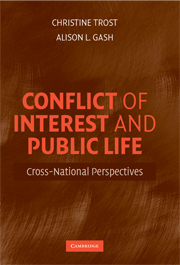Introduction
Published online by Cambridge University Press: 31 October 2009
Summary
Prevention and regulation of conflicts of interest among public officials has become a central theme in the study and practice of democratic politics. Recent political events have only intensified the spotlight on corruption in government, ending the careers of prominent politicians and fueling efforts to place comprehensive ethics reform at the top of the agendas of political leaders eager to reverse the steady erosion of public trust. In the United States, ethics scandals involving lobbyist Jack Abramoff, former House Majority Leader Tom DeLay, and other political actors are credited with contributing to significant Republican losses in the 2006 congressional election and ushering in a wave of ethics reforms sponsored by the newly anointed Democratic House leadership. In 2005, a conflict-of-interest scandal ended the political career of a British Labour Party official, Secretary of State for Work and Pensions David Blunkett, and prompted the chairman of the Committee on Standards in Public Life to call for a review of the Ministerial Code. Political and administrative ethics scandals have influenced the outcome of the past two federal elections in Canada. Subsequently, the new Conservative government proposed its Federal Accountability Act, which offers a wide range of measures to increase accountability, transparency, and oversight in government operations. Other Western democracies have been similarly affected by elections that have been won or lost partly or primarily over ethics scandals.
- Type
- Chapter
- Information
- Conflict of Interest and Public LifeCross-National Perspectives, pp. 1 - 18Publisher: Cambridge University PressPrint publication year: 2008



